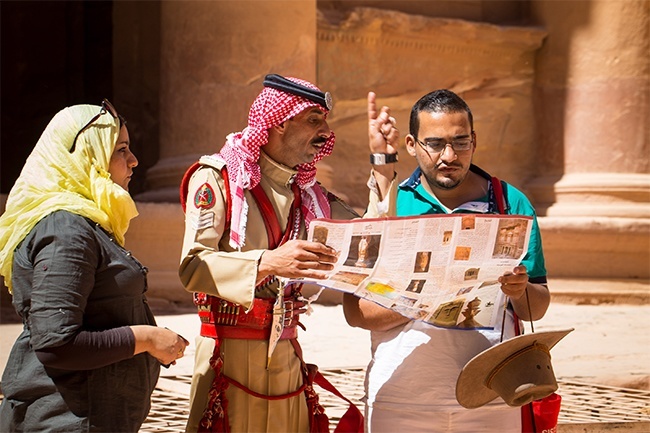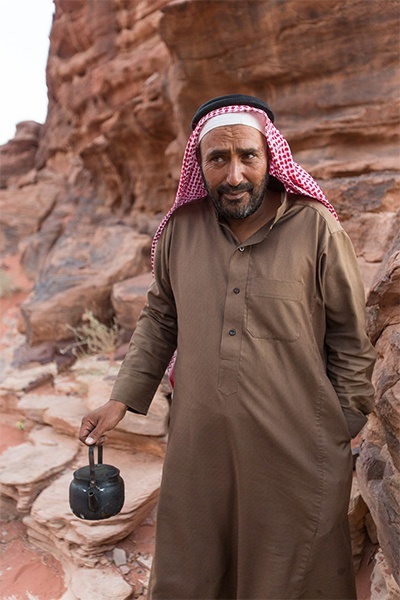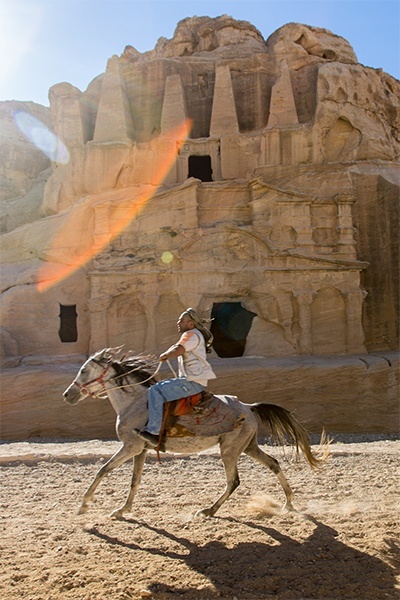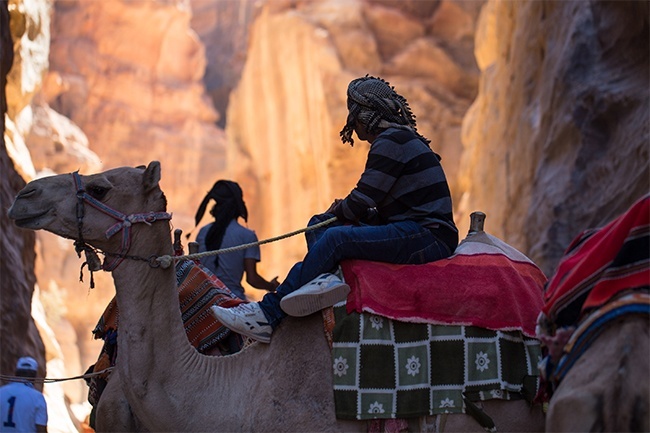
Photographer: TOM TRACY | FC
A Bedouin military man on duty at Jordan�s Petra guides tourists near the site�s famous Treasury building, carved into the side of a rock and seen in one of the Raiders of the Lost Ark films as the mythical location of the holy grail. The caves, however, were mostly burial sites of the Nabataean people.

Photographer: TOM TRACY | FC
A Bedouin man serves afternoon tea in Jordan�s Wadi Rum, or Valley of the Moon, desert in southern Jordan, a location made famous for its connection with British officer T. E. Lawrence, who passed through several times during the Arab revolt of 1917-18. The village of Wadi Rum itself consists of several hundred Bedouin inhabitants with their goat-hair tents and concrete houses and also their four wheel vehicles.
Wadi Rum, JORDAN | Their ingenuity in the vast Arabian deserts is well known � it was a Bedouin youth who discovered the Dead Sea Scrolls in the Judean caves of Qumran in 1947. What may be less known is their unwavering code of hospitality and honor.
In Jordan, where they make up some 40 percent of the population, it is said that a Bedouin cannot refuse a stranger three night�s lodging and sustenance � although if that stranger stays longer he or she may be asked to help cook or clean on the fourth day. Inter-clan disputes are discussed with the tribal sheik and generally settled over a pot of coffee.
Jordan�s Bedouin roots stress excellent manners, and etiquette in Jordan has been so fully honed by years of tribal interaction that it is part of the national identity � which includes strong support for a moderate monarchy under King Abdullah II.

Photographer: TOM TRACY | FC
At Jordan�s Petra, a Bedouin man races past visitors at the well-preserved and once lost ancient city built by Nabataean traders and conceivably a location where the three wise men of the New Testament may have stopped to purchase their gifts. Horses, camels and donkeys are a popular way to explore Petra.
�They are really generous people,� said Basil Ahmad, a native of Jordan and a professional guide who works with the Jordan Tourism Board. �Even if you have a shortage of money they would loan you some.
�They are really a very good people who are part of the community, and you feel safe in a Bedouin village � you can leave your door open, your property outside. If somebody takes something it means someone has strayed in from outside the village.�
Although their ancient origins are somewhat a matter speculation, the Bedouin live in many of the Arab counties and are today mostly Muslim � although some families are Christian.
It is perhaps the same ancient Holy Land culture of welcome which is what led Abraham to welcome the angels from God, unbeknownst to him � and a family-oriented culture that is reflected in Jewish-Christian traditions. Their emphasis on family, tradition and honor point back to the biblical stories of the patriarchs and the matriarchs.
In Jordan, the tribes generally live near Aqaba port city on the Red Sea, near Petra and Wadi Rum desert. They sell lambs, goats, sheep, camels (which can cost $3,000 each and up to $40,000 for racing camels in Wadi Rum). Over the years, more and more have moved into the cities and seek education for their children.
�Their life is very simple, it is not complicated,� Ahmad said, noting that Syria, Iraq, Saudi Arabia, Egypt, Israel and the West Bank are also home for Bedouin, some of whom migrate within the region.
�They are really smart and intelligent people in terms of how they adapt themselves to the environment here,� Ahmad said, adding that the Jordan desert�s 800 variations of plants and herbs are often sought for developing pharmaceuticals in the West.

Photographer: TOM TRACY | FC
Bedouin guides patrol the entrance and narrow alleyways through Jordan�s Petra, the ancient city built by Nabataean traders and conceivably a location where the three wise men of the New Testament may have stopped to purchase their gifts.





